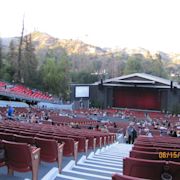Search results
Greek Theatre History. 2700 North Vermont Avenue. Los Angeles, California 90027. Located within Los Angeles, Griffith Park, the historic Greek Theatre stands as one of the nation’s most beloved and recognized outdoor entertainment venues.
- Upcoming Events
2700 North Vermont Avenue Los Angeles, California 90027...
- Parking & Shuttle
The Greek Theatre is committed to reducing its carbon...
- Code of Conduct / A-Z Guide
Greek Theatre parking is very limited, including accessible...
- Connect
Greek Theatre 2700 North Vermont Avenue Los Angeles,...
- Box Office
2700 North Vermont Avenue Los Angeles, California 90027...
- ADA Information
The Greek Theatre will provide full wheelchair accessible...
- Upcoming Events
- The Origins of Tragedy
- A Greek Tragedy Play
- Competition & Celebrated Playwrights
- Greek Comedy - Origins
- A Greek Comedy Play
- Legacy
The exact origins of tragedy (tragōida) are debated amongst scholars. Some have linked the rise of the genre to an earlier art form, the lyrical performance of epic poetry. Others suggest a strong link with the rituals performed in the worship of Dionysos such as the sacrifice of goats - a song ritual called trag-ōdia - and the wearing of masks. In...
Plays were performed in an open-air theatre (theatron) with wonderful acoustics and seemingly open to all of the male populace (the presence of women is contested). From the mid-5th century BCE entrance was free. The plot of a tragedy was almost always inspired by episodes from Greek mythology, which we must remember were often a part of Greek reli...
The most famous competition for the performance of tragedy was as part of the spring festival of Dionysos Eleuthereus or the City Dionysia in Athens. The archon, a high-ranking official of the city, decided which plays would be performed in competition and which citizens would act as chorēgoi and have the honour of funding their production while th...
The precise origins of Greek comedy plays are lost in the mists of prehistory, but the activity of men dressing as and mimicking others must surely go back a long way before written records. The first indications of such activity in the Greek world come from pottery, where decoration in the 6th century BCE frequently represented actors dressed as h...
Although innovations occurred, a comedy play followed a conventional structure. The first part was the parados where the Chorus of as many as 24 performers entered and performed a number of song and dance routines. Dressed to impress, their outlandish costumes could represent anything from giant bees with huge stingers to knights riding another man...
New plays were continuously being written and performed, and with the formation of actors' guilds in the 3rd century BCE and the mobility of professional troupes, Greek theatre continued to spread across the Mediterranean with theatres becoming a common feature of the urban landscape from Magna Graecia to Asia Minor. In the Roman world plays were t...
- Mark Cartwright
Theatre of ancient Greece. Bronze statue of a Greek actor, 150–100 BC. The half-mask over the eyes and nose identifies the figure as an actor. He wears a man's conical cap but female garments, following the Greek custom of men playing the roles of women. Later, slave women were brought in to play minor female characters and in comedy as well.
Feb 1, 2023 · The Odeon of Herodes Atticus is one of the most emblematic ancient Greece theaters. Located just underneath the Acropolis Hill, it is an imposing landmark of Athens. This majestic theatre was commissioned between 160-174 AD by Herodes Atticus, a wealthy orator, philosopher and writer.
- The three types of theatre in Ancient Greece were tragedy, comedy and satyr play.
- The ancient Greek word for theatre is 'theatron'. This is where the word 'theatre' comes from. In modern Greek, the word 'theatro' is used to indic...
- The God of theatre in Ancient Greece was Dionysus. He was also the God of wine, grapes and grape harvesting, madness and religious ecstasy.
- Theater was invented in Ancient Athens in the 6th-5th century BC.
- Actors in Ancient Greece did not wear makeup. Instead, they wore full-face masks, that were made of various materials such as leather and fabric. D...
Jan 24, 2024 · Aeschylus. Aeschylus o Aeschines, artist unknown, 18th century, via Museo del Prado, Madrid. Aeschylus, the first of the three tragedians with surviving works, was born around 525/4 BCE at Eleusis (the polis where the Eleusinian Mysteries took place). Like many Greek men, Aeschylus served in the military and fought in the Greco-Persian Wars.
Little is known about the origins of Greek tragedy before Aeschylus (ca. 525-ca. 455 B.C.), the most innovative of the Greek dramatists. His earliest surviving work is Persians , which was produced in 472 B.C.
Western theatre - Ancient Greece, Drama, Tragedy: The first time theatre truly freed itself from religious ritual to become an art form was in Greece in the 6th century bce when the dithyramb was developed. This was a form of choral song chanted at festivals in honour of Dionysus, the god of wine, fruitfulness, and vegetation. Originally, it celebrated his rejuvenation of the earth; later, it ...
People also ask
What is the largest ancient Greek Theatre?
Where did theatre come from in ancient Greece?
What is Greek theatre based on?
What was the Greek theater like?


